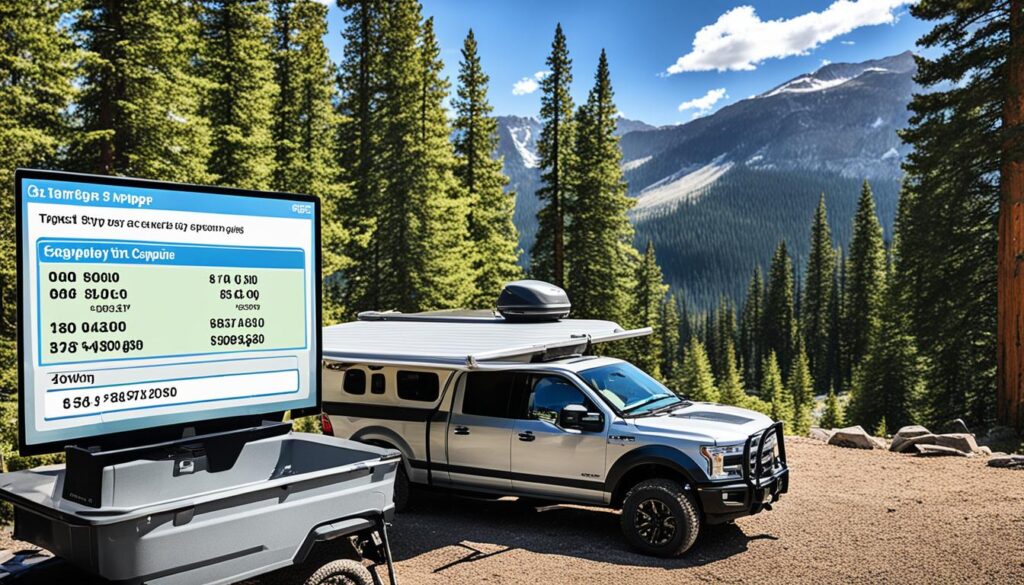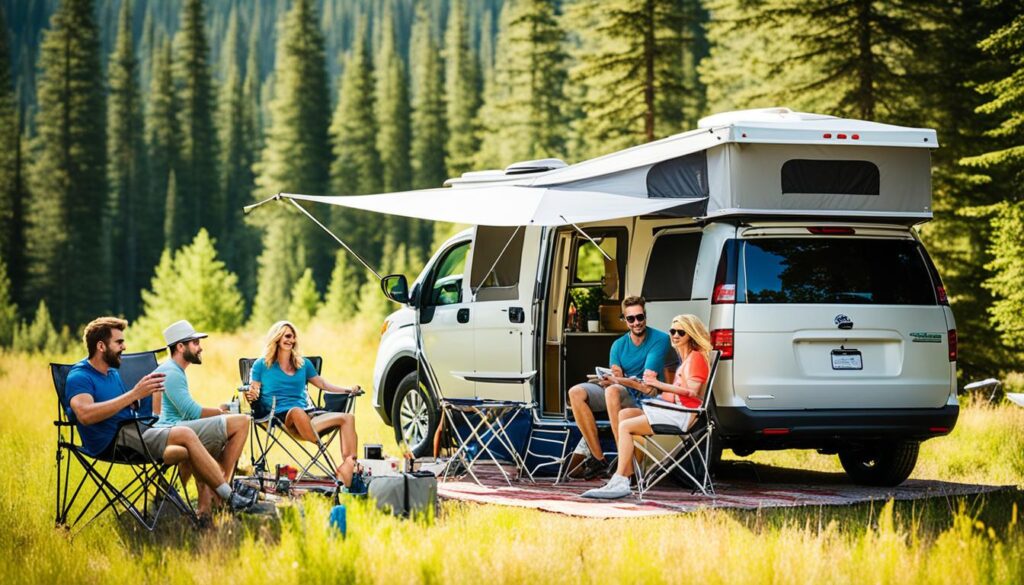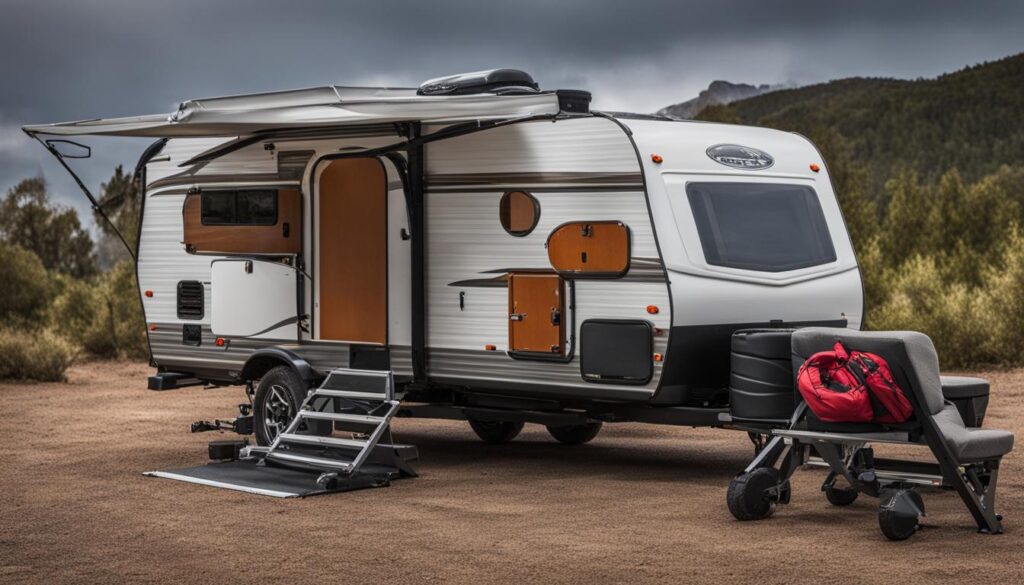Are you planning your next outdoor adventure and considering a pop-up camper? But do you know just how heavy these campers can be? The weight of a pop-up camper can significantly impact your towing capacity and overall travel experience. So, before you hit the road, let’s delve into the world of pop-up campers and explore their weight.
Key Takeaways:
- Pop-up campers come in various weights, ranging from as little as 600 pounds to as much as 4,500 pounds.
- The average weight of a pop-up camper is around 2,000 pounds.
- Understanding weight ratings such as UVW, CCC, GAWR, and GVWR is crucial for safe towing.
- Knowing your vehicle’s towing capacity and staying within that limit is essential.
- Pop-up campers offer numerous benefits, including affordability, better gas mileage, and a closer connection to nature.
Contents
- 1 Understanding Pop Up Camper Weight Ratings
- 2 Determining Your Vehicle’s Towing Capacity
- 3 Different Sizes and Weights of Pop Up Campers
- 4 Benefits of Owning a Pop Up Camper
- 5 Pros and Cons of Pop Up Campers
- 6 Pop Up Campers vs. Expandable Trailers
- 7 Choosing the Right Travel Trailer for Your Needs
- 8 FAQ
- 9 Source Links
Understanding Pop Up Camper Weight Ratings
When purchasing a pop-up camper, it’s crucial to understand the different weight ratings associated with it. These weight ratings ensure safe towing and help you determine the camper’s capacity for gear and supplies. Let’s take a closer look at the key weight ratings you need to consider.
1. Unloaded Vehicle Weight (UVW)
The Unloaded Vehicle Weight (UVW) refers to the weight of the camper when it reaches the manufacturer with a full fuel tank. It includes the weight of the camper’s standard equipment and optional accessories. The UVW provides a baseline weight that you need to consider before loading the camper with additional items.
2. Cargo Carrying Capacity (CCC)
The Cargo Carrying Capacity (CCC) indicates the maximum weight of gear and supplies that can be added to the camper. It includes items like food, water, camping equipment, and personal belongings. It’s important to stay within the CCC to ensure safe and balanced towing.
3. Gross Axle Weight Rating (GAWR)
The Gross Axle Weight Rating (GAWR) determines the maximum weight that the trailer’s axles can support. It’s essential to know the GAWR to avoid overloading the axles, which can lead to unsafe towing conditions and potential damage to the camper.
4. Gross Vehicle Weight Ratio (GVWR)
The Gross Vehicle Weight Ratio (GVWR) is the total weight allowed for both the camper and the items inside the towing vehicle. It includes the weight of the camper itself, as well as passengers, fuel, and other cargo inside the vehicle. Exceeding the GVWR can strain your vehicle’s capabilities and compromise safety.
By understanding these weight ratings, you can make informed decisions when selecting a pop-up camper and ensure that you stay within the camper’s weight limits. It’s essential to carefully assess the weight of your gear and supplies before embarking on your camping adventures.
| Weight Rating | Description |
|---|---|
| Unloaded Vehicle Weight (UVW) | The weight of the camper when it reaches the manufacturer with a full fuel tank, including standard equipment and optional accessories. |
| Cargo Carrying Capacity (CCC) | The maximum weight of gear and supplies that can be added to the camper. |
| Gross Axle Weight Rating (GAWR) | The maximum weight that the trailer’s axles can support. |
| Gross Vehicle Weight Ratio (GVWR) | The total weight allowed for both the camper and the items inside the towing vehicle. |
Determining Your Vehicle’s Towing Capacity
Before towing a pop-up camper, it’s crucial to determine your vehicle’s towing capacity. This information ensures that your vehicle is capable of safely pulling the weight of the camper without causing any strain or damage. To find your vehicle’s towing capacity, there are a few methods you can use.
Referencing Your Vehicle’s Owner’s Manual
One of the easiest ways to determine your vehicle’s towing capacity is by referring to the owner’s manual. The manual provides specific details about your vehicle, including its towing capabilities. Look for the towing section in the manual, which usually includes a table or chart that lists the towing capacity for different configurations of your vehicle.
Looking Up the Vehicle Identification Number (VIN)
If you don’t have access to the owner’s manual, another option is to look up the Vehicle Identification Number (VIN) of your vehicle. The VIN is a unique identifier assigned to every vehicle, and it contains information about its specifications, including the towing capacity. Online platforms, such as the manufacturer’s website or VIN decoding websites, can provide access to this information by entering your vehicle’s VIN.
Once you determine your vehicle’s towing capacity, it’s important to stay several hundred pounds below that limit. This allows for additional gear or water that you may carry during your camping trips. Keeping the weight within limits also reduces wear and tear on your vehicle, ensuring its longevity and performance.
When assessing the total weight of the camper, don’t forget to factor in the weight of water. Remember, water weighs eight pounds per gallon, so if you plan to carry water in your camper, be sure to account for its weight in your calculations.

Different Sizes and Weights of Pop Up Campers
Pop-up campers come in various sizes and weights to cater to different camping needs. Understanding the different sizes and weights available can help you choose the best lightweight pop up camper for your adventures.
There are three main sizes of pop-up campers: small/mini, medium, and large. Let’s explore each size category:
Small/Mini Pop Up Campers
Small or mini pop-up campers are the lightest and most compact options available. They typically weigh under 1,000 pounds, making them easy to tow with most vehicles that have a trailer hitch. These campers are perfect for solo campers or couples who prioritize mobility and want a simple camping experience.
Medium Pop Up Campers
Medium-sized pop-up campers weigh between 1,000 to 2,000 pounds. They offer a good balance between weight and functionality, making them suitable for small families or couples who desire a bit more space. These campers often feature additional amenities and sleeping areas, providing a comfortable camping experience.
Large Pop Up Campers
Large pop-up campers are the heaviest in the category, weighing over 2,000 pounds. These campers are ideal for larger families or groups who need more sleeping and living space. Despite their weight, they still offer the convenience of collapsibility and can be towed by larger vehicles equipped with the necessary towing capacity.
The weight of a pop-up camper is also influenced by the amenities and features it includes. Additional features such as appliances, toilets, and storage compartments can add to the overall weight of the camper. Consider your camping needs and the weight capacity of your towing vehicle when choosing the ideal pop-up camper for your outdoor adventures.
| Pop Up Camper Size | Weight Range | Recommended for |
|---|---|---|
| Small/Mini | Under 1,000 pounds | Solo campers or couples |
| Medium | 1,000 – 2,000 pounds | Small families or couples |
| Large | Over 2,000 pounds | Larger families or groups |
Benefits of Owning a Pop Up Camper
Pop-up campers offer several benefits for outdoor enthusiasts. Whether you’re a seasoned camper or new to the world of camping, lightweight pop up campers are a fantastic option to consider. Here are some of the reasons why owning a pop-up camper can enhance your camping experience:
- Affordability: Compared to larger RVs, lightweight pop-up campers are more budget-friendly. They provide a cost-effective alternative for those who want to enjoy camping without breaking the bank.
- Better Gas Mileage: One of the advantages of lightweight pop up campers is that they are designed to be towed by smaller vehicles. Their compact and lightweight nature allows for better fuel efficiency, saving you money on gas during your trips.
- Ease of Storage: Thanks to their collapsible design, lightweight pop-up campers are easy to store when not in use. They take up less space compared to larger RVs, making them ideal for those with limited storage options.
- Flexibility: Unlike traditional trailers, pop-up campers allow for greater flexibility during your camping adventures. Once you’ve set up the camper at your campsite, you have the option to leave the trailer behind and explore the surrounding area in your vehicle, providing you with the freedom to truly immerse yourself in nature.
- Connection to Nature: Lightweight pop-up campers offer a unique camping experience that closely resembles traditional tent camping. With their tent-like design, you can enjoy the open sky, fresh air, and the sounds of nature while still having the comfort and convenience of a camper.
Pop-up campers bridge the gap between tent camping and RV camping, offering a balance of affordability, convenience, and a more immersive outdoor experience.” – John Smith, Camping Enthusiast
With their countless benefits, it’s no wonder that lightweight pop up campers are a popular choice among camping enthusiasts.
Next, let’s dive deeper into the pros and cons of pop-up campers to help you make an informed decision before your next camping adventure.
Pros and Cons of Pop Up Campers
Pop-up campers have both advantages and disadvantages. Let’s take a closer look at the pros and cons:
Advantages of Pop Up Campers
- Affordability: Pop-up campers are a cost-effective option compared to larger RVs. They offer a budget-friendly way to enjoy outdoor adventures.
- Lightweight Design: These campers are significantly lighter than traditional trailers, making them easier to tow and maneuver.
- Ease of Towing: Due to their lightweight construction, pop-up campers can be towed by a wider range of vehicles, providing more flexibility for travelers.
- Lower Maintenance Requirements: With fewer complex systems and components, pop-up campers generally require less maintenance, saving both time and money.
- Experience Nature Closely: Pop-up campers allow you to immerse yourself in nature. With their large windows and open design, you can enjoy panoramic views and the sounds of the great outdoors.
Disadvantages of Pop Up Campers
- Lack of Amenities: Compared to larger RVs, pop-up campers may have limited amenities such as a bathroom or kitchen. However, many campers do offer basic facilities.
- Limited Sleeping Capacity: Pop-up campers usually have smaller sleeping areas, accommodating fewer people than larger trailers or RVs.
- Potential Restrictions: Some campgrounds may have restrictions on pop-up campers or have limited availability for these types of campers.
- Setup and Teardown Time: Pop-up campers require more time for setup and teardown compared to traditional trailers or RVs. It’s important to consider this if you prefer quick and easy camping experiences.

| Pros | Cons |
|---|---|
|
Affordability Lightweight Design Ease of Towing Lower Maintenance Requirements Experience Nature Closely |
Lack of Amenities Limited Sleeping Capacity Potential Restrictions Setup and Teardown Time |
Pop Up Campers vs. Expandable Trailers
When considering the options for your next camping adventure, you may find yourself torn between a pop-up camper and an expandable trailer. While both offer unique advantages, it’s important to understand the differences to make an informed decision.
Pop-Up Campers: Lightweight and Versatile
Pop-up campers are renowned for their lightweight design, making them easy to tow and maneuver. With their collapsible nature, they provide the flexibility of a tent camping experience with added amenities and comforts.
“Pop-up campers are perfect for camping enthusiasts who value portability and ease of towing. They are an excellent choice for those who enjoy exploring various campsites and want the freedom to unhitch their camper and explore the area in their vehicle.”
Pop-up campers are ideal for individuals or families who prioritize lightweight options, as they tend to have a lower overall weight compared to traditional trailers.
However, it’s important to note that pop-up campers may have limited space and sleeping capacity compared to larger trailers. They may also have fewer amenities, such as a bathroom or kitchen, depending on the model chosen.
Expandable Trailers: Comfort and Added Features
For those seeking a bit more comfort and amenities without sacrificing the lightweight and compact design, expandable trailers provide an excellent alternative.
“Expandable trailers offer a middle ground between the lightweight pop-up campers and the more spacious traditional trailers. They provide a slightly larger sleeping and living space, making them an excellent choice for those who desire added comfort and amenities while still maintaining the easy towing capabilities of a pop-up camper.”
Expandable trailers feature expandable sections that can be easily set up at the campsite, providing additional living space when compared to pop-up campers. This design allows for more amenities, including larger kitchens, bathrooms, and sleeping areas.
Choosing the Right Option for You
When deciding between a pop-up camper and an expandable trailer, it’s essential to consider your specific needs and priorities. Assess factors such as:
- Your towing vehicle’s weight capacity
- The number of occupants and their accommodation needs
- Your camping preferences and desired level of comfort
- The amenities and features you can’t live without
By carefully evaluating these factors, you can determine whether the lightweight versatility of a pop-up camper or the added comfort and amenities of an expandable trailer align better with your camping style and needs.
Choosing the Right Travel Trailer for Your Needs
When it comes to selecting the perfect travel trailer, there are a few key factors to consider. First and foremost, you need to determine the weight that your vehicle can safely tow. This is essential for ensuring a smooth and secure towing experience. Take into account your vehicle’s towing capacity and make sure to stay within its limits. By doing so, you’ll avoid any unnecessary strain on your vehicle and ensure a safe journey.
Next, think about your camping habits and requirements. Are you someone who enjoys rustic and minimalist camping experiences? Or do you prefer a higher level of comfort and amenities? Pop-up campers offer a lightweight and compact option, making them ideal for those seeking a more adventurous and nature-oriented camping experience. On the other hand, expandable trailers provide a middle ground between pop-up campers and traditional trailers, offering added comfort and amenities while still remaining lightweight.
Finally, consider your personal preferences when it comes to comfort and amenities. If you prioritize a lightweight and easy-to-tow option, a pop-up camper may be the best choice for you. They are known for being the lightest pop-up campers available. On the other hand, if you desire a bit more space and amenities, an expandable trailer might be the way to go. Both options have their pros and cons, so it’s important to carefully evaluate your needs before making a decision.
FAQ
What is the weight of a pop-up camper?
Pop-up campers come in various sizes and weights. Smaller pop-up campers can weigh as little as 600 pounds, while larger ones can weigh up to 4,500 pounds. However, the average weight of a pop-up camper is around 2,000 pounds.
What are the weight ratings associated with pop-up campers?
The weight ratings associated with pop-up campers include the Unloaded Vehicle Weight (UVW), Cargo Carrying Capacity (CCC), Gross Axle Weight Rating (GAWR), and Gross Vehicle Weight Ratio (GVWR). These ratings determine the weight limits and capacities of the camper and the towing vehicle.
How can I determine my vehicle’s towing capacity?
To determine your vehicle’s towing capacity, you can reference your vehicle’s owner’s manual or look up the VIN number. It’s important to stay several hundred pounds below your vehicle’s towing capacity to allow for additional gear or water.
What are the different sizes and weights of pop-up campers?
Pop-up campers come in three main sizes – small/mini, medium, and large. Small or mini pop-ups are generally under 1,000 pounds, medium pop-ups weigh between 1,000 to 2,000 pounds, and large pop-ups weigh over 2,000 pounds. The weight of a pop-up camper also depends on the amenities and features it includes.
What are the benefits of owning a pop-up camper?
Pop-up campers offer several benefits, including affordability, lightweight design, ease of towing, lower maintenance requirements, and a closer connection to nature. They are also more fuel-efficient compared to RVs and easier to store due to their collapsible design.
What are the pros and cons of pop-up campers?
The pros of pop-up campers include affordability, lightweight design, ease of towing, lower maintenance requirements, and a closer connection to nature. The cons include limited sleeping capacity, potential restrictions in certain campgrounds, and the need for more setup and teardown time compared to traditional trailers or RVs.
What is the difference between pop-up campers and expandable trailers?
Pop-up campers and expandable trailers offer different levels of comfort and amenities. Pop-up campers are more lightweight and affordable, while expandable trailers provide more space and amenities but still maintain a lighter and more compact design compared to traditional trailers.
How do I choose the right travel trailer for my needs?
When choosing a travel trailer, consider factors such as your vehicle’s towing capacity, camping habits and requirements, and the level of comfort and amenities you desire. Evaluate the pros and cons of pop-up campers and expandable trailers, and choose the option that best suits your needs and preferences.






